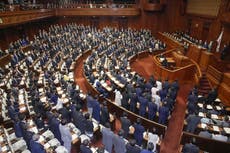I was at the ‘sex and gender’ debate in parliament. What I saw both horrified and depressed me
The SNP’s Joanna Cherry was caught on camera eye-rolling while Kirsty Blackman outlined the struggles of trans people, writes Robin Moira White. Why are we accepting such dishonourable behaviour from honourable members of parliament?


I attended the Westminster Hall debate of the competing petitions calling for the Equality Act to be amended to redefine “sex” to mean biological sex (109,463 signatures), and not to do so (138,886 signatures). Around 30 MPs turned up to contribute to the debate, and there were some powerful speeches on both sides. In opening the debate Tonia Antoniazzi (Labour, Gower) called for respectful debate and at the end MPs congratulated themselves on how respectful the whole affair had been.
That wouldn’t be the impression you’d get if you were to look at social media, though. At one point SNP MP Kirsty Blackman was talking about the life struggles of a trans constituent. Caught on camera behind her, MP, lawyer and anti-trans campaigner Joanna Cherry MP KC (SNP, Edinburgh South West) gives the biggest eye-roll imaginable and then appears to mouth the words “What rubbish”. Rosie Duffield (Labour, Canterbury) puts her head in her hands and Neal Harvey (Alba, Kirkcaldy and Cowdenbeath) plays along. It’s a shocking sequence, and has already gained over a million views on Twitter.
Their behaviour defines the speeches of those supporting the “amend” petition. All the old tropes appeared. Statements that trans people should be supported and protected, before going on to support measures that would effectively banish us from society. Statements that equate trans people with criminals and speak of eliminating us from society because of the “risks” posed to women and girls. All so redolent of the way gay people were characterised during the time of section 28 in the 1990s. The fact that 13 years of the current legislation have not thrown up any real problems appears to have passed those MPs by.
Is the Equality Act difficult to follow? No. I have worked as a discrimination barrister for approaching 30 years. I have dealt with the 2010 Equality Act for 13 of them. It is a masterful piece of legislation dealing with nine separate protected characteristics, and allowing nuance.
Trans people can be excluded from single-sex spaces if it is a proportionate means of achieving a legitimate aim. This is, effectively, permitted discrimination and is rightly, tightly controlled. If we are to accommodate trans people, then they need, in most circumstances, to be treated in the gender/sex they have transitioned to. Otherwise, transition is meaningless. “Third spaces” as a ghetto for trans people to be banished to is not the answer. “Third spaces” offering additional privacy for those who need or want it can be provided consistent with the existing legislation.
The first petition proposals, calling for “sex” to be redefined as “biological sex” are at once muddled, unfair and unworkable. At the eleventh hour, the promoters – presumably realising that it is mightily difficult to satisfactorily define “biological sex” – have switched to calling for sex in the Equality Act to be “original birth certificate sex”, unchanged by a subsequent Gender Recognition Certificate.
UN special rapporteur on sexual orientation and gender identity Victor Madrigal-Borloz recently reported that the intention was to find a definition of “sex” that excluded trans people. The practical problems with any such change soon become obvious with a little thought.
Trans men, for example, who often look very masculine would be forced into female spaces and women would be forced to accept them there. Nuance and choice would be eliminated by a poorly thought out “sledgehammer” policy.
Our society and the people that make it up are complex, and legislation dealing fairly with all of us will necessarily be complex. Additional guidance for businesses and service providers may well be helpful, as long as it is provided by a respected source; not the disgraced and disgraceful Equality and Human Right Commission, whose name now has Orwellian “doublethink” overtones for many. Complexity and diversity is to be welcomed and celebrated, not denigrated, “clarified” out of existence and banished, as would seem to be the case for trans constituents in Canterbury, Edinburgh, Kirkaldy or Cowdenbeath should they approach their MPs.
Fortunately, both the opposition and even the present government appear to recognise the difficulties and complexities of such legislation. Responding at the end of the debate, Anneliese Dodds, Labour shadow equalities minister, supported the existing legislation and Maria Caulfield, junior equalities minister, spoke of the further work that is necessary before any proposal can be brought forward. Hopefully, a refresh of government at the forthcoming general election will allow mature reflection on the way forward for all.
Robin Moira White is the first barrister to transition in practice at the discrimination bar and is the joint author of the leading text on transgender law
Join our commenting forum
Join thought-provoking conversations, follow other Independent readers and see their replies
Comments


Bookmark popover
Removed from bookmarks